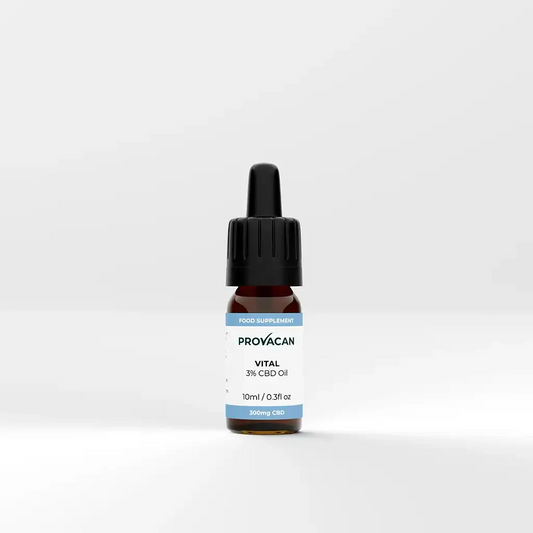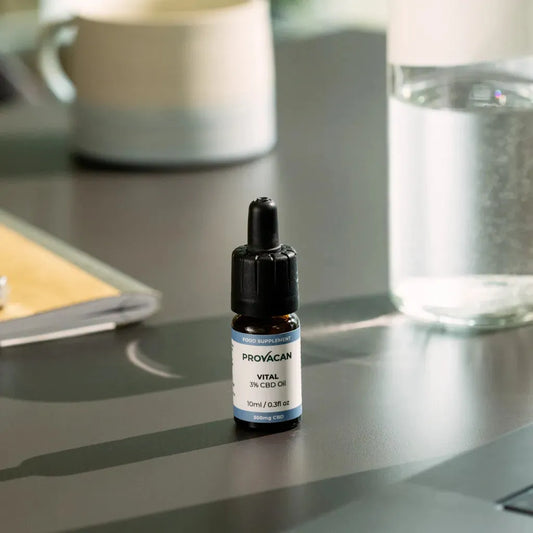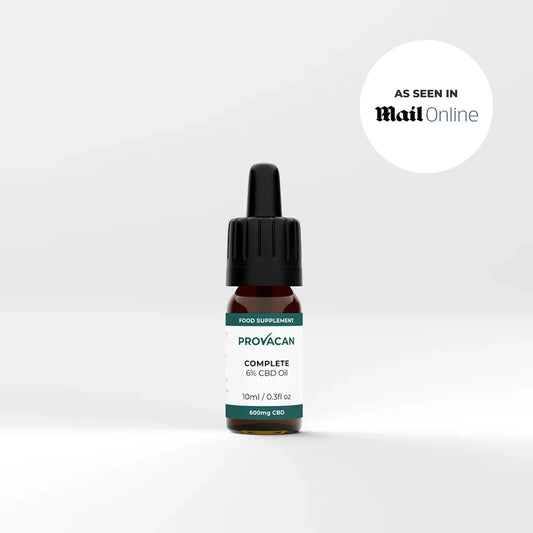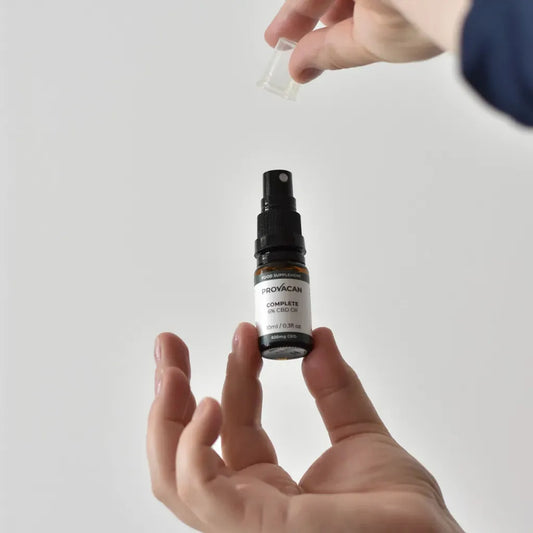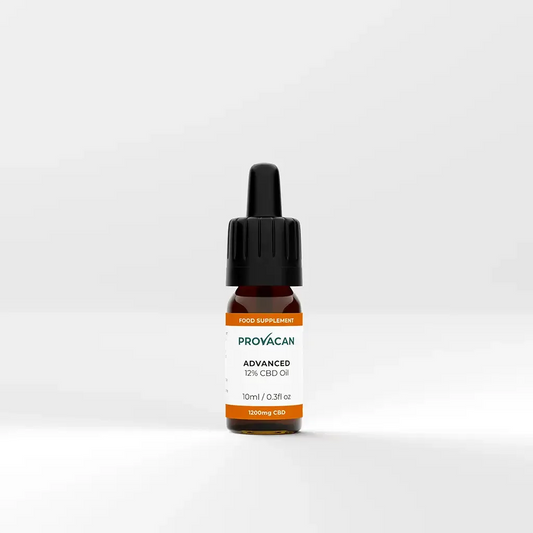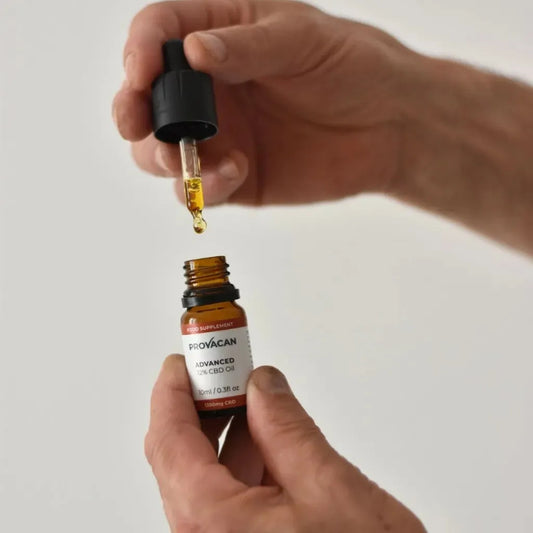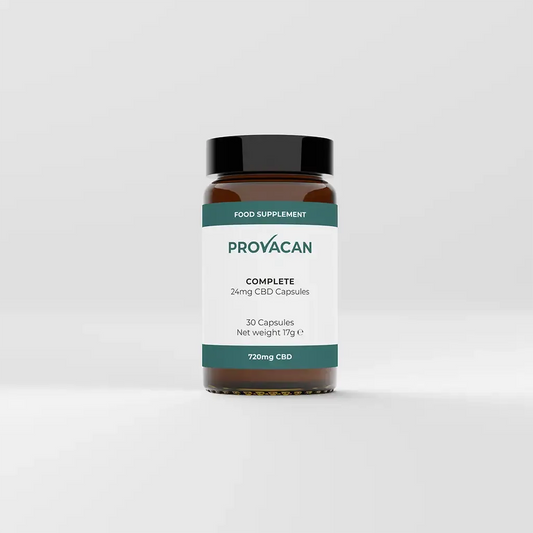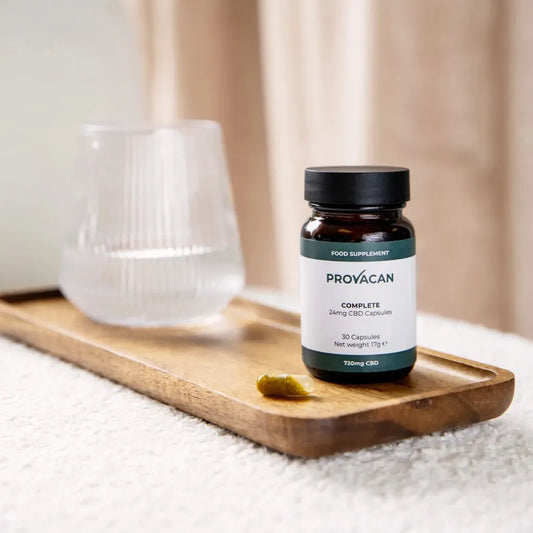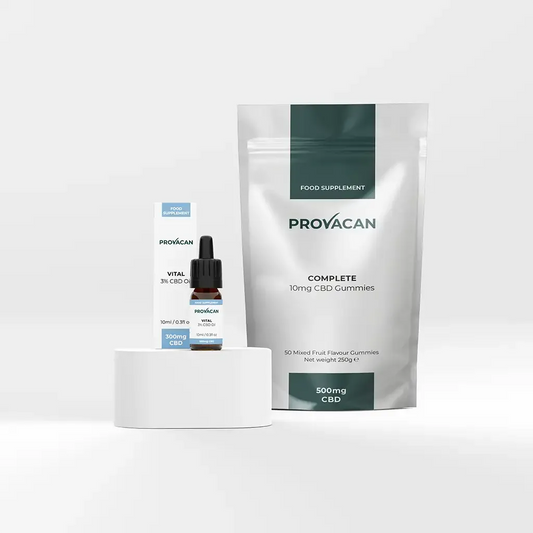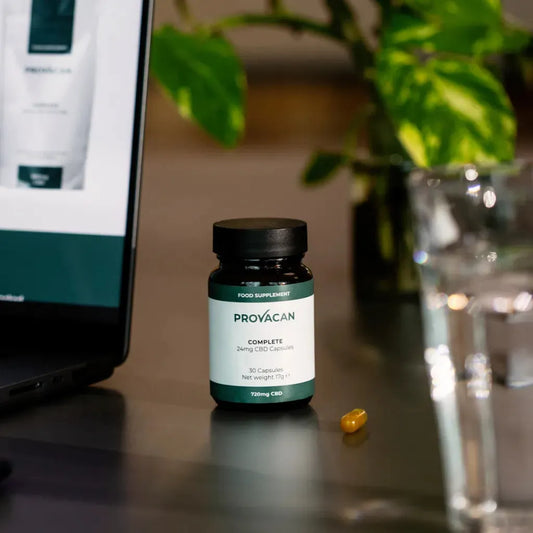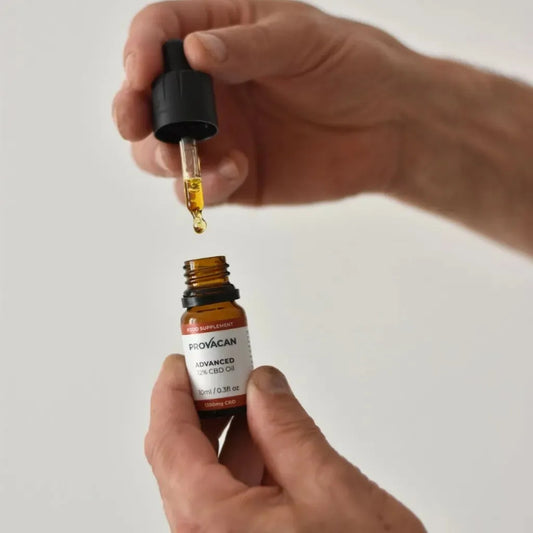Collection: CBD For Sleep
Are the stresses of life keeping you awake at night? Discover tranquillity with our calming sleep range, specifically designed to help you fall asleep effortlessly and stay asleep throughout the night. CBD is a safe and non-drowsy alternative that aids in reducing stress and promoting a natural sleep process. Say goodbye to restless nights and hello to rejuvenating sleep.
Subscribe and unlock 3 exclusive Sleep eBooks written by our registered nutritionist offering expert insights to improve sleep, naturally.
-
Book your free consultation
Get expert guidance on natural ways to support sleep, stress, and more.
BOOK NOW
-
Provacan Vital CBD Oil | 300mg / 3% CBD, 10ml
4.6 / 5.0
(124) 124 total reviews
Regular price £24.99Regular priceUnit price / per -
Provacan Complete CBD Oil | 600mg / 6% CBD, 10ml
4.7 / 5.0
(198) 198 total reviews
Regular price £34.99Regular priceUnit price / per -
Provacan Advanced CBD Oil | 1200mg / 12% CBD, 10ml
4.7 / 5.0
(215) 215 total reviews
Regular price £49.99Regular priceUnit price / per -
Provacan Complete CBD Capsules | 24mg CBD per capsule, 30 Pack
4.6 / 5.0
(169) 169 total reviews
Regular price £34.99Regular priceUnit price / per -
Provacan Vital CBD Starter Kit
Regular price £38.99Regular priceUnit price / per£47.98Sale price £38.99Sale -
Provacan Complete CBD Starter Kit
Regular price £73.99Regular priceUnit price / per£92.97Sale price £73.99Sale -
Provacan Advanced CBD Oil | 1200mg / 12% CBD, 10ml - 3 Months Subscription
5.0 / 5.0
(3) 3 total reviews
Regular price £104.97Regular priceUnit price / per£149.97Sale price £104.97Sale
Key Takeaways:
- CBD's Sleep Benefits: CBD has shown potential in improving sleep quality by interacting with the endocannabinoid system, which helps regulate sleep patterns and reduce factors like anxiety and pain that can disrupt rest. Its calming and relaxing properties can create a more conducive environment for falling and staying asleep.
- Safe and Non-Psychoactive: Unlike THC, CBD is non-psychoactive and non-addictive, making it a safer alternative for sleep support without altering your state of mind. It helps promote relaxation and alleviate discomfort without the risk of dependence.
- High-Quality Products Matter: Choosing high-quality CBD products, such as those from Provacan, is crucial for ensuring safety and effectiveness. Opt for products made from organically grown hemp with transparent third-party lab testing to guarantee purity and potency.
How Does CBD Affect Sleep?
CBD interacts with the body's endocannabinoid system, which plays a crucial role in regulating various functions, including sleep. Anxiety can often be a major obstacle when trying to fall asleep, as racing thoughts and worries can keep the mind awake. CBD works by interacting with receptors in the brain that regulate anxiety, helping to calm the mind and promote a sense of tranquillity.
In addition to reducing anxiety, CBD also has the potential to promote relaxation. In today's fast-paced world, many individuals struggle with stress and tension, which can make it difficult to unwind and prepare for sleep. CBD has been found to have relaxing properties, helping to soothe both the body and mind. By promoting relaxation, CBD can create an environment that is conducive to a restful night's sleep.
Furthermore, CBD's ability to alleviate pain and inflammation can also contribute to improved sleep. Chronic pain conditions, such as arthritis or fibromyalgia, can often disrupt sleep patterns and prevent individuals from getting the rest they need. CBD has been shown to have analgesic and anti-inflammatory properties, which can help reduce pain and discomfort, allowing for a more comfortable sleep experience.
Unlike its cousin THC, CBD doesn't have psychoactive effects. This means that it won't make you feel high or alter your state of mind. Instead, CBD in forms from gummies to oils can promote a sense of calm and relaxation, making it easier to fall asleep and stay asleep throughout the night. Remember to consult with a healthcare professional before incorporating CBD into your sleep routine, as they can provide personalised advice based on your specific needs and circumstances.
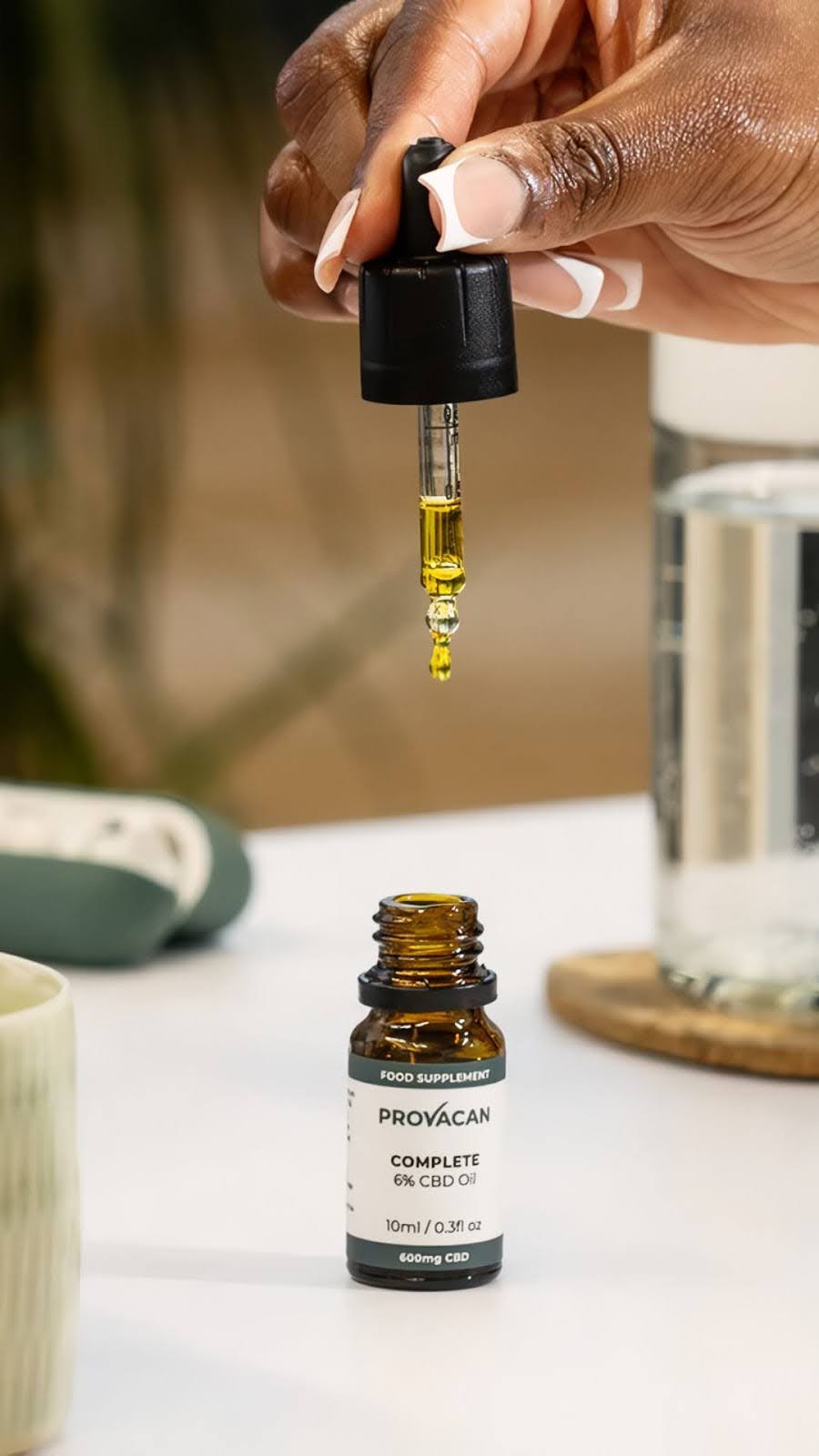
Why Should I Use Provacan CBD?
When it comes to selecting a CBD product for sleep, quality is crucial. Provacan CBD is a reputable brand known for its high-quality products and commitment to transparency. Their CBD oils are made from organically grown hemp, ensuring a pure and potent formulation. Additionally, Provacan provides third-party lab test results, so you can trust that our high-quality products are free from contaminants and accurately labelled.
A study published in the Permanente Journal (Shannon, Lewis, LEE, & Hughes, 2019, March 1) found that CBD effectively reduced anxiety and improved sleep scores among individuals with either anxiety or sleep-related disorders. Another study published by Curr Psychiatry Rep. (Babson KA, Sottile J, Morabito 2017, April) suggested that CBD may have positive effects on sleep disorders such as insomnia and sleep apnea.
While further research is still needed to fully understand the mechanisms behind CBD's sleep-enhancing effects, these initial findings are promising and support CBD's potential as a natural sleep aid.
Misconceptions About CBD For Sleep
Despite its growing popularity, there are still some misconceptions and concerns surrounding CBD. One common misconception is that CBD is addictive or intoxicating. As mentioned earlier, CBD does not produce psychoactive effects and is non-addictive. It is safe to use and does not pose any risk of dependence.
Another concern is the potential for side effects. While CBD is generally well-tolerated, some individuals may experience mild side effects such as dry mouth, drowsiness, or changes in appetite. These side effects are typically temporary and subside as your body adjusts to CBD. It's important to start with a low dose and monitor your body's response to avoid any adverse effects.
Tips for Incorporating CBD into Your Nighttime Routine for Better Sleep
If you're interested in trying CBD to improve your sleep, here are some tips for incorporating it into your nighttime routine:
- Start with a low dose: Begin with a low dose of CBD and gradually increase it until you find the optimal dosage for your sleep needs.
- Choose the right product: Consider your preferences and choose a CBD product that suits your lifestyle, such as CBD capsules, oils, or gummies.
- Take it before bedtime: CBD can take some time to take effect, so it's best to take it about an hour before you plan to go to sleep.
- Create a relaxing environment: Pair your CBD intake with other relaxing activities such as taking a warm bath, practising meditation or deep breathing exercises, and creating a calming sleep environment.
Can CBD Regulate Sleep Patterns?
Sleep patterns are regulated by the body's internal clock, also known as the circadian rhythm. This biological mechanism is influenced by various factors, including light exposure, melatonin production, and the endocannabinoid system. CBD interacts with the endocannabinoid system to modulate sleep-wake cycles, helping to restore balance and promote healthier sleep patterns.
CBD's interaction with receptors in the brain and nervous system plays a role in controlling sleep-related disorders such as insomnia and sleep apnea. By calming overactive brain activity and reducing inflammation, CBD can help individuals achieve a more restful and uninterrupted sleep.
Comparing CBD with Traditional Sleep Medications
When it comes to tackling sleep issues, many individuals turn to traditional sleep medications. However, with the rising popularity of CBD as a natural alternative, it's important to explore how these two options compare.
Traditional sleep medications, such as benzodiazepines and over-the-counter sleep aids, work by targeting brain receptors to induce drowsiness. While effective in some cases, they come with a range of potential side effects, including daytime drowsiness, dizziness, and the risk of dependence or withdrawal symptoms.
On the other hand, CBD offers a natural approach to improving sleep quality without the adverse effects commonly associated with traditional medications. CBD interacts with the endocannabinoid system in the body, which plays a crucial role in regulating various functions, including sleep patterns. By promoting balance and homeostasis, CBD may help alleviate issues like anxiety, pain, or stress that can negatively impact sleep.
It's essential to note that while CBD shows promise in promoting better sleep, individual responses may vary. Some may find relief with CBD, while others may require different approaches. As with any supplement or medication, it's advisable to consult with a healthcare provider before incorporating CBD into your sleep routine, especially if you are currently taking other medications.
Dosing Guidelines for CBD and Sleep
When it comes to using CBD for sleep, determining the right dosage can be crucial to achieving optimal results. While CBD is generally well-tolerated, finding the right amount for your individual needs may require some experimentation. Here are some dosing guidelines to consider:
Start Low and Slow: It's recommended to begin with a low dose of CBD and gradually increase it until you find the desired effects. This allows your body to adjust and helps you understand your personal response to CBD.
Consider Your Weight and Metabolism: Individuals with higher body weights may require higher doses of CBD to experience its effects, while those with faster metabolisms may process CBD more quickly.
Consult with a Healthcare Professional: If you are unsure about the right dosage or if you have any underlying health conditions, it's always best to consult with a healthcare professional before starting a CBD regimen.
Follow Product Recommendations: Different CBD products may have varying concentrations and absorption rates. Always follow the dosing instructions provided by the manufacturer to ensure safety and effectiveness.
Timing Matters: For sleep support, taking CBD approximately 30 minutes to an hour before bedtime may help promote relaxation and improve sleep quality.
Monitor Your Response: Pay attention to how your body responds to different dosages of CBD. Keep track of changes in your sleep patterns, mood, and overall wellbeing to fine-tune your dosage.
Legal and Safety Considerations
Legal Status
In the UK, CBD products are legal as long as they contain less than 0.2% THC. It's essential to purchase CBD products from reputable sources that provide third-party lab test results to ensure compliance with legal limits. By doing so, you can rest assured that you are using a legal and safe product for your sleep needs.
Safety Precautions
While CBD is generally well-tolerated, it's important to consult with a healthcare professional before using CBD, especially if you are currently taking any medications or have underlying health conditions. Your healthcare provider can offer personalised guidance on incorporating CBD into your sleep routine and monitor for any potential interactions with existing medications.
Quality of CBD Products
When selecting a CBD product for sleep, opt for high-quality products like those offered by Provacan. Ensure that the CBD is extracted from organically grown hemp using clean extraction methods to avoid harmful contaminants. Investing in premium CBD products guarantees that you are receiving a safe and effective product to support your sleep quality.
Dosage and Timing
Start with a low dosage of CBD and gradually increase it until you find the right dose to support your sleep. It's recommended to take CBD around 30 minutes before bedtime to allow sufficient time for the compound to take effect. Pay attention to how your body responds to different dosages to optimise the benefits of CBD for a restful night's sleep.
Final Thoughts
In conclusion, CBD has shown promising potential as a natural remedy for those struggling with sleep issues. The compound's interaction with the endocannabinoid system and other receptors in the body may help regulate sleep patterns, promote relaxation, and alleviate factors that hinder a good night's rest.
At Provacan, we are committed to your wellbeing and providing you with the highest quality CBD products that are backed by scientific research and rigorous standards. Our dedication to excellence ensures that you receive safe and effective options for improving your sleep quality.
Remember that consistent use, proper dosing, and high-quality products are key factors in maximising the benefits of CBD for sleep support. Provacan is here to support you on your journey to better sleep and overall wellbeing, offering premium CBD products crafted to enhance your quality of life.
Sources:
- Shannon, S., Lewis, N., LEE, H., & Hughes, S. (2019, March 1). The Permanente Journal® - Kaiser Permanente. https://www.thepermanentejournal.org/. https://www.thepermanentejournal.org/doi/full/10.7812/TPP/18-041
- Babson KA, Sottile J, Morabito D. Cannabis, Cannabinoids, and Sleep: a Review of the Literature. Curr Psychiatry Rep. 2017 Apr;19(4):23. doi: 10.1007/s11920-017-0775-9. PMID: 28349316.
- Busse J W, Vankrunkelsven P, Zeng L, Heen A F, Merglen A, Campbell F et al. Medical cannabis or cannabinoids for chronic pain: a clinical practice guideline BMJ 2021; 374 :n2040 doi:10.1136/bmj.n2040
Collapsible content
What is CBD?
CBD, short for cannabidiol, is a natural compound found in hemp plants. It is non-intoxicating and has been studied for its potential therapeutic benefits.
Is CBD legal?
In the UK, CBD products are legal as long as they contain less than 0.2% THC. It is important to ensure the CBD products you purchase adhere to legal guidelines.
How does CBD work for sleep?
CBD interacts with the endocannabinoid system, which plays a role in regulating various functions in the body, including sleep. CBD may help promote relaxation and support a healthy sleep cycle.
What are the benefits of using CBD for sleep?
Some potential benefits of using CBD for sleep include improved sleep quality, reduced anxiety, and enhanced relaxation before bedtime.
Are there any side effects of using CBD for sleep?
While CBD is generally well-tolerated, some individuals may experience side effects such as drowsiness, dry mouth, or changes in appetite. Start with a low dose and monitor how your body responds.
How much CBD should I take for sleep?
The optimal dosage of CBD for sleep can vary depending on individual factors such as weight, metabolism, and the severity of sleep issues.

